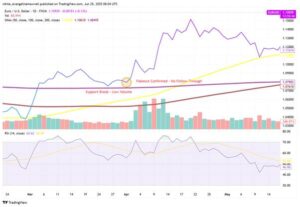New Zealand Reserve Bank (RBNZ) Governor Adrian Orr recently expressed concerns that global stock markets are overvalued, particularly as investors seem to be underestimating the risks posed by ongoing geopolitical tensions. Orr made these comments during an interview with CNBC while attending an International Monetary Fund (IMF) meeting in Washington.
Overvaluation of Stock Markets
Orr pointed out that many traders worldwide have been betting on central banks loosening tight monetary policies as inflation eases. However, he remains particularly concerned about the equity markets, where he believes investors are not fully considering the growing global risks.
“The markets have priced in a 'perfect run' for some time, and the current environment seems to support that narrative, with interest rates coming down,” Orr said. “But when you look at price-to-earnings ratios and other measures of fair value, it’s clear that risk is being underpriced or mispriced.”
Orr further explained that current market prices sometimes diverge significantly from long-term fundamentals. “People are too excited, and fair value is well below where current prices are.” He added that he had been concerned about this situation for quite some time.
Disconnect Between Stock Markets and Economic Reality
The S&P 500 index has surged by 22% over the past year and is up by the same percentage since the end of 2021, a time when interest rates were at rock-bottom levels, and monetary conditions were highly stimulatory. While the stock market’s performance appears strong, Orr cautioned that it does not reflect the reality of the challenges facing the global economy.
For instance, despite ongoing risks such as Russia’s continued invasion of Ukraine, escalating conflicts in the Middle East, heightened militarization around the world, and uncertainty surrounding the U.S. presidential election, stock markets have continued to climb. Orr worries that these geopolitical factors are not being adequately factored into stock prices.
“It could be a slow and unexpected Fed easing that suddenly spooks the market, causing oversized reactions like we recently saw in Japan,” Orr explained.
Trade Protectionism and Resource Misallocation
During the interview, Orr was also asked about the potential economic impact of a second Donald Trump presidency, particularly in light of Trump’s protectionist trade policies. While Orr did not specifically mention Trump, he emphasized New Zealand’s heavy reliance on international trade, particularly with China. He warned that if relationships with key trading partners are weakened by geopolitical tensions, New Zealand’s economy could suffer.
Orr expressed confusion over the rise in global trade protectionism, describing it as “bad economics.” He argued that trade fragmentation and protectionism have resulted in unnecessary economic costs, misallocating resources and ultimately harming global growth.
“There’s a lot of deadweight cost being generated globally due to trade fragmentation and protectionism, and it’s bad. Resources are being misallocated dramatically,” Orr added.
Uncertainty Over Future Interest Rate Cuts
Orr’s interview came shortly after he delivered a speech at the Peterson Institute in Washington, where he discussed the RBNZ’s monetary policymaking. However, he did not provide clear guidance on when the central bank might lower the Official Cash Rate (OCR), which currently stands at 4.75%.
Orr noted that firms’ pricing behavior and the persistence of inflation remain key considerations for the RBNZ’s Monetary Policy Committee (MPC). Despite the uncertainties, Orr expressed confidence in New Zealand’s economic trajectory, stating that the central bank is now in a position to project a future of low inflation, less restrictive interest rates, and revitalized economic activity.
However, Orr also emphasized that the effects of monetary policy often have a one- to two-year lag, comparing the process to “circumnavigating the ocean” in an uncertain environment.
Market Reaction
Following Orr’s speech and interview, market reactions were relatively muted, with investors taking a wait-and-see approach. While Orr raised concerns about global equity overvaluation, there were no immediate significant shifts in market behavior.
Conclusion
Orr’s concerns about global stock market overvaluation highlight the challenges facing the global economy, particularly as geopolitical risks and protectionist trade policies continue to rise. The disconnect between stock prices and economic reality, as well as the potential mispricing of risk, are factors that forex market participants should closely monitor. Understanding these global uncertainties will be crucial for navigating future market conditions and making informed investment decisions.





